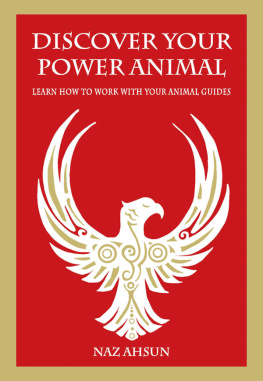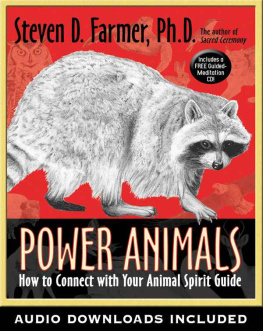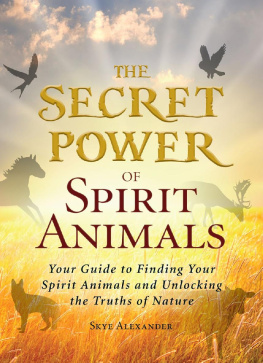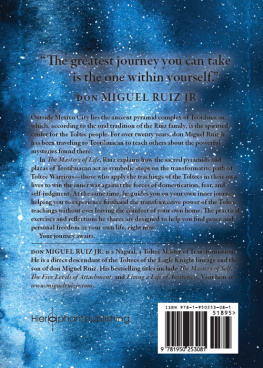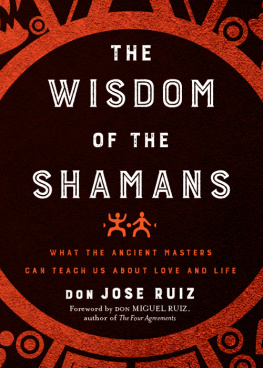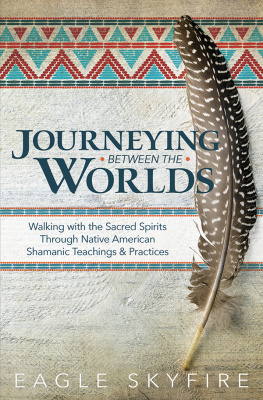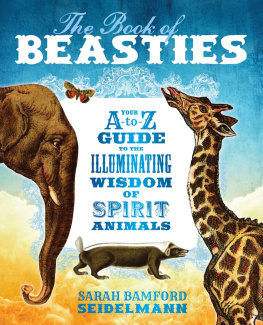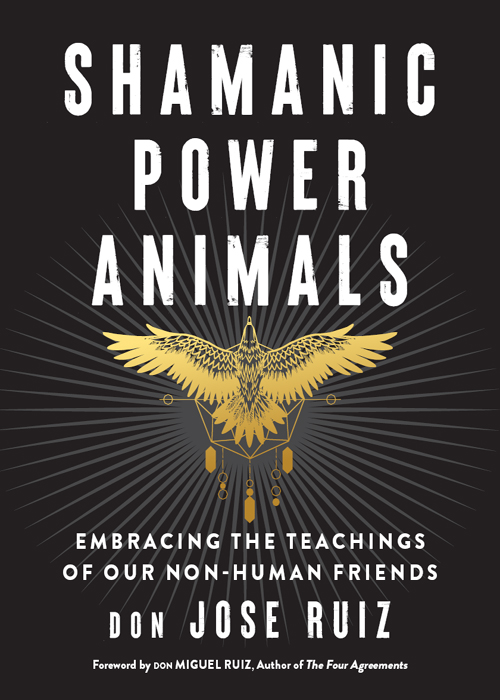


Copyright 2021 by don Jos Ruiz
All rights reserved, including the right to reproduce this work in any
form whatsoever, without permission in writing from the publisher,
except for brief passages in connection with a review.
Cover design by Emma Smith
Cover art by Peratek || Shutterstock
Part Page Illustrations by Varlamova Lydmila and KHIUS || Shutterstock
Medicine Wheel Illustration by Garylarts
Animal Illustrations || Shutterstock
Print book interior design by Frame25 Productions
Hierophant Publishing
8301 Broadway, Suite 219
San Antonio, TX 78209
www.hierophantpublishing.com
If you are unable to order this book from your local bookseller,
you may order directly from the publisher.
Library of Congress Control Number: 2021933209
ISBN 978-1-950253-14-2
10 9 8 7 6 5 4 3 2 1
www.redwheelweiser.com
www.redwheelweiser.com/newsletter
Being human has always meant
perceiving ourselves in a circle of animals.
Paul Shepard
CONTENTS
FOREWORD
In the Toltec tradition we teach the importance of cultivating respect for the other animals that cohabitate with us on this beautiful planet. We also recognize the power that all animals have to teach us through their characteristics, their behavior, and the wealth of cultural and mythological stories that reveal our interconnection with these amazing creatures since ancient times.
Animal stories also illuminate the fact that out of the astonishingly vast diversity of life on earth, we human animals have been given the added ability to shape our reality through our imagination, language, and manual dexterity. Equipped with these potent gifts, humans can analyze, create, and refine. We build cultures, transform ourselves, and modify nature and the natural world. These are unique powers reserved for the human animal, and we have a responsibility to use these powers wisely and for the benefit of the whole.
Sadly, we know that this is often not the case. Many animals are being harmed and their habitats destroyed as a result of human action and inaction, and any lasting remedy for this will only occur once human beings become willing to look within and make changes based on unconditional love instead of greed and fear.
Of course, as humans, we have also misused our gifts to cause great suffering to ourselves, both externally and internally. We are the only animals that berate ourselves, that compare and reject ourselves, and that judge ourselves as being not enough. We punish ourselves over and over for the same mistakes, and we take the emotional poison created in the process and inflict pain on others.
Other animals don't do any of this, and in this way they can be our teachers, especially when it comes to the practice of how to live in the present moment. They remind us not to judge, berate, or go against ourselves in any way. Animals are free of these human tendencies, inviting us instead to live in harmony with the way things are.
In this book, my son don Jos Ruiz shares the wisdom of animals from the depths of his heart. He teaches us that knowledge about the animal world can provide metaphors to help us free our minds and become the artists of our own lives. As you will soon see, unconditional love is the basis for his work.
In these pages, he shows the many ways that we humans can learn from the animal world. At the same time, because we project our own knowledge, emotions, and experiences onto the world around us, working with animals is also a profound way to illuminate the mysteries within ourselves.
For instance, as we observe the behavior of animals, we tend to compare it with our own. We want to be like some animals, to reflect their grace or strength or wisdom. But we may fear other animals or hold their behavior in contempt. In this way, we learn about ourselves and what we want to change about our lives.
That's not to say the wisdom in this book is to be taken as the final authority. For millennia, we have invented, told, and retold stories about animals and our relationship to them. These can certainly be helpful, but if we aren't careful, we may come to believe that these stories are absolute truth. This is how the mind can turn helpful stories into superstitions, and they can make us susceptible to people who would manipulate us for their own gain.
The Toltec tradition reminds us to free ourselves from all superstitions, including any we may have about the animal world, and to trust in our own intuition insteadsomething animals have never forgotten.
I hope this book brings love and joy to your life, and that it will hold a special place in your library as an ongoing, insightful resource you'll return to for years to come.
With all my love,
don Miguel Ruiz
INTRODUCTION
When her cub is old enough, Mother Jaguar takes him out into her territory, where she teaches her young one to stalk, swim, hide, and make a home. Seven changes of the season come and go, and soon the cub is ready to venture out on his own.
One day, the young jaguar comes upon a small group of deer. He stalks them cautiously, trying to remember his mother's lessons but feeling unsure of himself. The deer turn and see him, and he falters, staring at them blankly. The deer laugh at him. Where is your mother? We are not afraid of you! The jaguar returns home, and for several days he will not go out alone. Instead, he trails behind his mother on her hunts, sullen and feeling small. Finally, she turns on him with a powerful, protective growl. Do not follow me. I will not hunt with you. You think I am the holder of power, but you are the holder of your own power. Never forgetyou are a jaguar.
As the mother leaps away into the trees, the young jaguar sees clearly. She has shared her knowledge of survival with him, but she has never given him the power he needs to be a jaguar. She can't give him that, even if she wanted to, because that power was always within him. From that day onward, he ventures into new territory as a jaguar, filling his belly, keeping balance among the creatures, and fulfilling his destiny.
My father, don Miguel Ruiz, a Nagual in our Toltec tradition and the author of The Four Agreements, told this story to me and a group of his closest apprentices several years ago. As he concluded the story, he turned to us and said, You are no longer my apprentices and I am no longer your teacher. Go into the world and chart your own destiny.
I love this story, as well as the context in which my father shared it, for a variety of reasons. First and foremost, it serves as a potent reminder that we all have the power within us, that we are all jaguars. Second, it shows us that learning from others is helpful and even necessary, but there comes a point in our journey when we must go out on our own. Lastlyand this is a point that is often overlookedthis story shows how shamans often use stories involving animals as powerful teaching examples for us. This is by design.
Notice how the jaguar invokes a particular feeling that a mere word cannot. You immediately paint a picture of the scene without even trying. You identify with the jaguar's experience while at the same time observing it from the outside. As we hear the story of the jaguar, we open up emotionally and even physically. It is a simple story on purpose, and it can therefore sink in on a deeper level than any wise saying or list of rules for living. This is the power of animal teachings.
Next page


